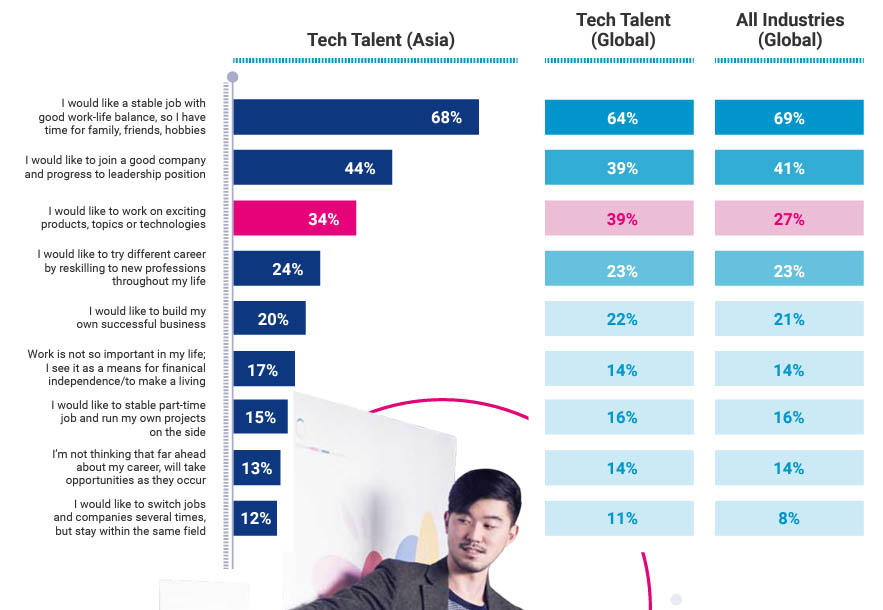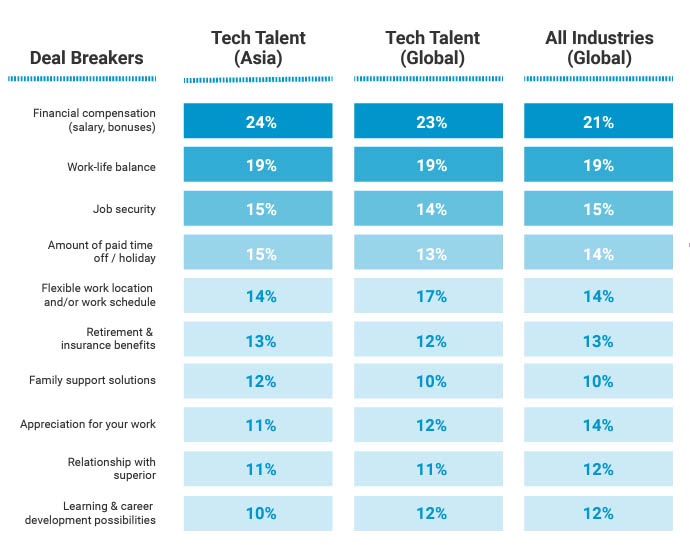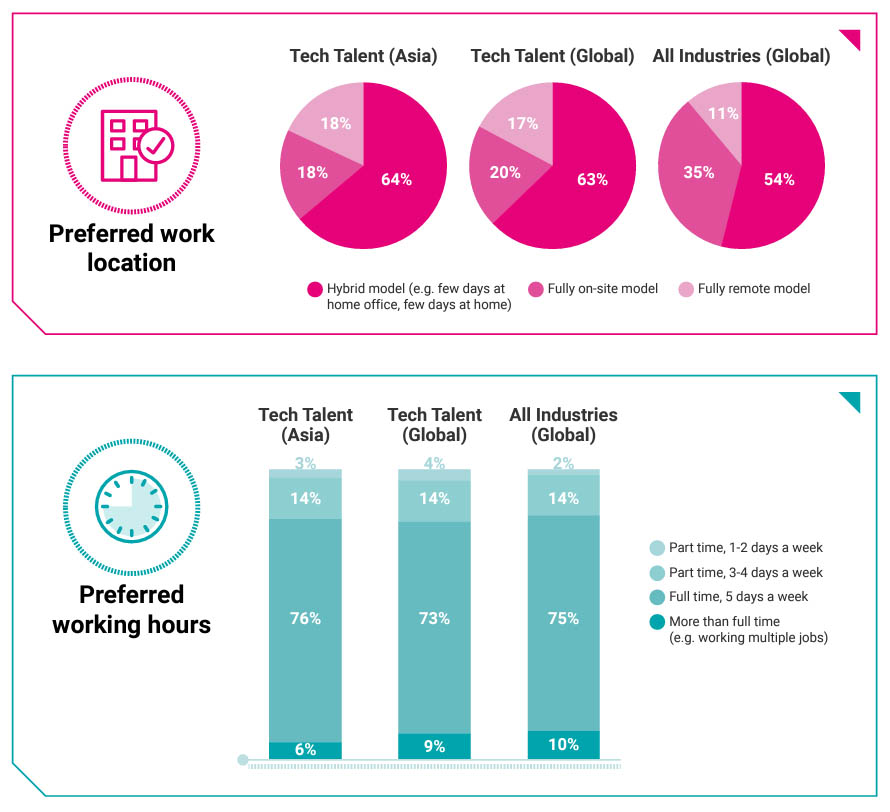Attracting Asian Tech Talent in the Great Resignation
Since 2021, many companies have been grappling with the challenges posed by the “Great Resignation.”
Understanding the “Great Resignation”
The “Great Resignation,” observed in 2021, refers to the widespread phenomenon where employees across various sectors, including business professionals and blue-collar workers, leaving their jobs in large numbers. This trend is particularly noticeable among mid-level employees aged 30 to 45, with a significant increase of over 20% compared to the previous year.
The surge in resignations is attributed to significant changes in the workplace environment due to the COVID-19 pandemic and shifts in workers’ preferences and values.
In such dynamic circumstances, what are the keys to success in the tech job market in Asia?
This blog article delves into the factors that attract and motivate top talent in this region. From stability and work-life balance to growth opportunities and economic stability, we will uncover the critical factors that underpin their decision-making.
From the “Great Resignation” to “Great Regret”: Exploring the Impact of Departure and Pursuit of Satisfaction
The onset of the pandemic marked the era of the “Great Resignation,” but what has transpired post-COVID?
According to CNBC, the “Great Resignation” has transitioned into a “Great Regret”, with individuals who quit or left their jobs now expressing regret.

・Surveys have revealed that over half of the workforce who quit during the “Great Resignation” now regret their decision.
・In December 2022, a record-high of 4.1 million people quit their jobs, surpassing 50 million resignations over the course of the year.
・Departures during this period have adversely affected mental health, work-life balance, workplace relationships, and prospects for reemployment.
・Amongst these, Generation Z expresses the most regret, with 89% regretting their decision to resign and experiencing declines in mental health.
・The job perks, benefits, and corporate culture that were enticing when employees resigned are not sufficient to maintain satisfaction in their new roles.
While some employers are open to rehiring former employees in response to the “Great Resignation,” others question loyalty and express concerns about rewards and incentives.
Despite layoffs in the tech sector, countries like Indonesia, Thailand, Hong Kong, Malaysia, the Philippines, and Singapore actively recruit tech talents.
81% of tech talents in Asia receive job offers several times a year, making them a highly sought-after talent pool.
How can companies effectively attract and retain such top talents while dispelling concerns about loyalty? What are these talents seeking from companies?
Trends in Job Seeking Activities Among Tech Talents in Asia
JobStreet by SEEK, in collaboration with Boston Consulting Group and The Network, released a survey titled “What tech jobseekers wish employers knew: Unlocking the future of Recruitment”, done with respondents of approximately 6,000 tech talents in Hong Kong and Southeast Asia. This survey aims to unveil insights into attracting tech talents in Asia, and was published in May 2023.
Ideal Career Path : Balanced and Stable Work-Life

・A majority of tech talents in Asia (68%) prioritize stable jobs that allow them to maintain a healthy work-life balance, ensuring time for family, friends, and hobbies. This trend aligns with tech talents globally (64%) and professionals across all industries (69%).
・Compared to global averages (39%) for tech talents and across all industries (41%), 44% of tech talents in Asia show high interest in career advancement and leadership roles in reputable companies, indicating their eagerness for growth and development within organizations.
・Approximately 34% of tech talents in Asia value opportunities to work on intriguing and innovative projects related to interesting products, topics, or technologies. Though slightly lower than the global average for tech talents (39%), this figure surpasses that of professionals across all industries (27%).
・A portion of tech talents in Asia (17%) view their jobs primarily as a means for economic independence and livelihood, prioritizing financial stability over career advancement or self-fulfillment. This percentage is higher than the global average for tech talents and professionals across all industries (both at 14%).
Key Factors in Job Searching : Emphasis on Financials and Work-Life Balance

・24% of tech talents in Asia prioritize financial rewards (salary, bonuses) as decisive factors in job searching, similar to the global average for tech talents (23%) and slightly higher than the overall industry average (21%).
・The percentage of tech talents in Asia who consider work-life balance as a key factor in job searching is 19%, comparable to both the global average for tech talents and the overall industry.
・When evaluating prospective employers, the third-most prioritized aspects are job stability and the number of paid holidays, with 15% of tech talents in Asia selecting each criterion, slightly exceeding the global averages for both tech talents and all industries.
・A relatively significant difference lies in the flexibility regarding work location and schedule. About 14% of tech talents in Asia value this factor, slightly lower than the global percentage for tech talents (17%) but consistent with the overall industry.
・Additionally, tech talents in Asia (12%) prioritize family support policies more than global tech talents and other global talents (both at 10%).
Ideal Working Arrangements : Flexibility is the Key

Work Location:
The majority of tech talents in Asia (64%) prefer a hybrid work model that combines office-based work with remote work (spending several days in the office and several days working from home), surpassing the preferences of global tech talents (63%) and other global talents (54%).
Working Hours:
The vast majority of tech talents in Asia (76%) prefer full-time work consisting of a five-day workweek. This preference aligns with the trends among tech talents worldwide (73%) and the overall industry globally (75%), albeit slightly higher among tech talents in Asia.
Summary: Succeeding in Asia’s Competitive Job Market
The transition from the “Great Resignation” to the “Great Regret” underscores the importance for employers to understand and address the needs and desires of workers.
While job stability and work-life balance remain crucial factors, workers have clear preferences and interests that worth to focus on when formulating recruitment and retention strategies.
Companies can maintain employee fulfillment and motivation by recognizing that Asian tech talents strongly desire opportunities for career advancement and leadership roles within the organization, as well as access to innovative technologies and projects.
Moreover, by providing economic security and competitive compensation packages, companies can alleviate anxieties and attract top talents.
Additionally, introducing flexible work arrangements such as hybrid work models tailored to the preferences of Asian tech talents can effectively balance work and personal life.
By understanding these factors and adapting their approach accordingly, companies can establish themselves as attractive employers and successfully acquire and retain tech talents in Asia’s fiercely competitive job market.


